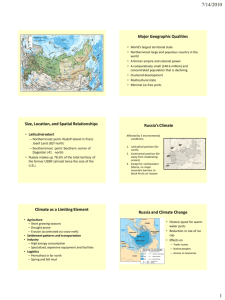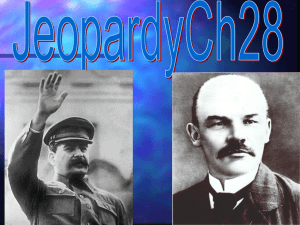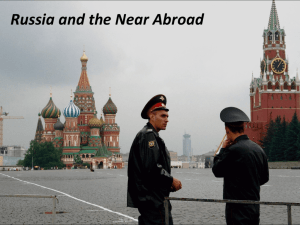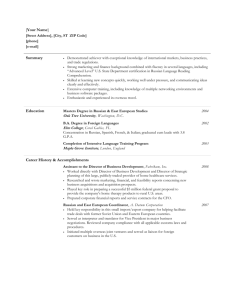Unit 7 Notes
advertisement
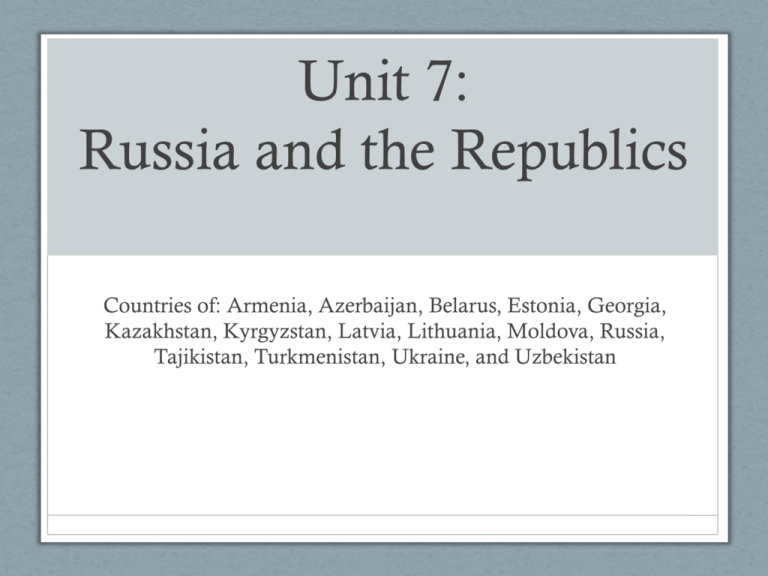
Unit 7: Russia and the Republics Countries of: Armenia, Azerbaijan, Belarus, Estonia, Georgia, Kazakhstan, Kyrgyzstan, Latvia, Lithuania, Moldova, Russia, Tajikistan, Turkmenistan, Ukraine, and Uzbekistan Vocabulary 1. Cultural diffusion–the process of knowledge, skills, and technology being spread from one culture to another 2. Demographics–the study of, or information about, people's lifestyles, habits, population movements, spending, age, social grade, employment, etc. 3. Dictatorship–a country, government, or the form of government in which absolute power is held by an individual or party Political Map Physical Map Climates Population Density Religions Languages Ethnic Groups Russia Ethnic Make-up Russia: 80% Russian, 70 other ethnic groups Mostly Orthodox Christians, some Muslims & Jews also Physical Characteristics • 1/6 of Earth’s land surface • 12 Time Zones • Northern European Plain • West Siberian Plain • Central Siberian Plateau • Russian Far East Northern European Plain • 1,000 miles wide • Chernozem • 75% of population lives here • Moscow, Kiev, and St. Petersburg located here West Siberian Plain • Ural Mountains: divides Europe and Asia • Eurasia • Area b/w Ural Mts. And Yenisey River Central Siberian Plateau and Russian Far East • HIGH plateaus • Lena River • Kamchatka Peninsula: 120 volcanoes- 20 still active • Sakhalin and Kuril Islands • Japan still claims Kuril Islands even though they were lost to Russia after WWII Southern Landforms Transcaucasia: Caucasus Mts. Central Asia: Stans, very arid b/c of high mts to the south Turan Plain • B/w Caspian Sea and Central Asia • Syr Darya and Amu Darya Rivers • Kara Kum and Kyzyl Kum Deserts Rivers Ob River Volga River: 60% of Russia’s river traffic Lakes Caspian Sea: largest inland sea, saltwater lake, tourism Aral Sea: since 1960 – lost 80% volume, irrigation Lake Baikal: deepest lake in the world (1 mile), 20% of world’s freshwater, 1,200 species unique to the lake, rather clean Siberia 1. 32 million ppl live here 2. -90 degrees to 94 degrees depending on the season 3. Permafrost to HUGE swamps 4. See Russian Winter ppt Abundant Resources • Natural Gas, Oil, Coal, Iron Ore, 1/5 of world’s timber, top producer of hydroelectricity • Problem: they’re in Siberia Climate Factors • Continentality • Tundra- arctic region • Taiga- south of the tundra • Steppe – chernozemUkraine through Kazakhstan • Desert- Turkmenistan & Western Uzbekistan Shrinking Aral Sea • Between 1960 & today, 80% lost • Syr Darya and Amu Darya diverted for irrigation • Pollution – 24 species of fish originally, all gone now • April 28, 1986 • Nuclear reactor exploded killing 31 people • Contaminated 100,000 sq. miles • Evacuated and resettled 250,000 ppl • Costs related to the disaster are over $300 billion • Millions exposed to nuclear radiation Chernobyl Trans-Siberian Railroad Russian Expansion Emergence of Russia • Russia Under the Czars: • Social Structure was feudalism until the 1800s • Serfdom was abolished in 1861 (start of American Civil War) • Czar: variant of Caesar – oversaw expansion Peter the Great • Famous czar who expanded from the Baltic Nations to the Pacific • Founded St. Petersburg as the new capital • Reading from book Catherine the Great • Famous czarina • Expanded into Poland, Belarus, and the Ukraine • Reading from book Russian Revolution • 1917 Vladimir Lenin led a revolt against Czar Nicholas II • Nicholas and his entire family were murdered (Anastasia story) • Lenin and the communists took over • New country is called USSR (Union of Soviet Socialist Republics) Rise of Communism • Russian Revolution: 1917 – Czars were abdicated: gave up their crowns • Karl Marx - Marxism • Set up a Republics Soviet: governing council • Supreme Soviet: Moscow – national laws • Command Economy: all businesses are govt. owned • Collective Farms: under Stalin, group farming Soviet System • Lenin and Stalin: Communist Dictatorship • Millions resisted and sent to forced labor camps & prisons in Siberia • Red Army: Soviet military • Cold War: nukes, tanks, jets, subs- world power Sputnik and the Space Race • October 4, 1957 • world's first artificial satellite • marked the start of the space age and the U.S.U.S.S.R space race. End of Communism • Mikhail Gorbachev: glasnost – openness in media • Perestroika: economic restructuring – gradual change to capitalism • Privatization: selling govt. owned businesses to private indv. • Boris Yelstin: 1991 – 1st democratic president • Vladimir Putin: 2000 – 2nd democratic president Distance Decay • Size & harsh climate make transportation hard • ¾ raw materials from Siberia • Rivers frozen in winter • Railroads: 93,000 mi of track, • Federal Districts to gain more support over regional leaders (7: Central, FarEastern, Northwest, Siberian, Southern, Urals, and the Volga) Economic Problems • Very polluted: oil spills; cancer • Shortage of money • 1998 Economic Crash: 40% of population in poverty • Inflation: Ruble: >$0.01 • No health care • Black Market: trade through barter, off the books • Alcoholism, Drug Abuse, divorce, and suicide are on the rise Russian Mafia • By 1998 the mafia had control of 40% of private companies and 60% of govt. owned companies • No tax revenue from those businesses • Mother Russia’s Children Transcaucasia: Georgia, Armenia, & Azerbaijan Caucasian Culture • MANY Languages (3 families) • Most are Christian or Muslim • Russian territory until 1991 • 50 different ethnic groups Georgia • Tourism and wine industry in subtropics • Tourism slowed with Abkhazian conflict • Supras: dinner party • Walnuts big part of diet • Own alphabet • Mostly Christian Azerbaijan • Oil industry • Lots of underground gas and oil wells • Many earthquakes • Most speak Azeri or Russian and use a Latin alphabet • 93% Muslim • Democracy • More Armenians live outside Armenia than in it • Own alphabet • Lake Sevan is one of the world’s largest mountain lakes • Armenian and Russian are main languages • Mostly Christian • Democracy Armenia Chechnya • Was not released from Russia at the fall of the Soviet Union • Russian invasion from 19942001 • Chechens want independence • Own language, separate ethnic group • Russian refuses Ossetia • Northern Ossetia is still part of Russia • Southern Ossetia is part of Georgia • Want independence, both countries say no • Resulted in 40,000 refugees • Truce, but no independence Nagorno-Karabakh • Azerbaijan claims the region b/c of history • Armenia claims the region b/c ¾ of its population is ehtnic Armenian • Cease-fire in 1994 left 1 million refugees • Now considered an enclave of Armenia Central Asia: the “Stans” The Silk Road The Great Game • Struggle between Russia and Great Britain for control of Central Asia • Soviets won and held control until 1991 • Soviet nuclear industry in Northern Kazakhstan • Between 1949 – 1989; Soviets exploded 470 nuclear devices • 180,000 sq. mi. effected • 1 million ppl exposed to radiation • Radiation still present Nuclear Testing Oil in the Region • Turkmenistan and Kazakhstan have lots of oil • Oil is the reason for the Great Game Ethnical Problems in Central Asia • Soviets drew boundary lines according to largest ethnic groups • Kazakh, Kyrgyz, Tajik, Turkmen, and Uzbek • Not perfect: Uzbeks 24% of Tajikistan, many Tajiks in Uzbekistan; Uzbeks are 9% of Turkmenistan and 14% of Kyrgyzstan • Many speak Russian and their ethnic language • Most are Muslim Yurt Baltic Republics Baltic Republics Estonia, Latvia, & Lithuania • Lithuania and Latvia share a similar language, whereas Estonia’s language is more similar to Finnish • Lithuania is Roman Catholic, whereas Latvia and Estonia are Lutheran • In 1939 all three were annexed: formally added to the Soviet Union • In 1991 they finally gained their independence Trying to Diversify • Estonia: mining, shipbuilding, manufacturing • Lithuania: food processing, shipbuilding, manufacturing machinery • Latvia: productions of cars, pharmaceuticals, electrical equipment Russian Republics Ukraine “Little Russia” • E. Orthodox • Kiev (capital): 1st Russian state began here over 1,000 years • 1920s Soviets forced farmers to give up land – Result: ppl burned crops, govt tried to seize crops & 8 mil died of starvation • Chernobyl disaster 1986: 12.3 mil acres polluted • Used to be part of the Breadbasket of Europe Belarus • Mainly Slavic • Orthodox • Economy: industry and services, oil reserves, potash – fertilizer • 1/5 of farmland contaminated in Chernobyl disaster Moldova • Densely populated • Former Romanian principality • Most people are Romanian descent • Exports: wine, sugar beets, and seed oils • 98% Eastern Orthodox Catholic Effects of Communism

